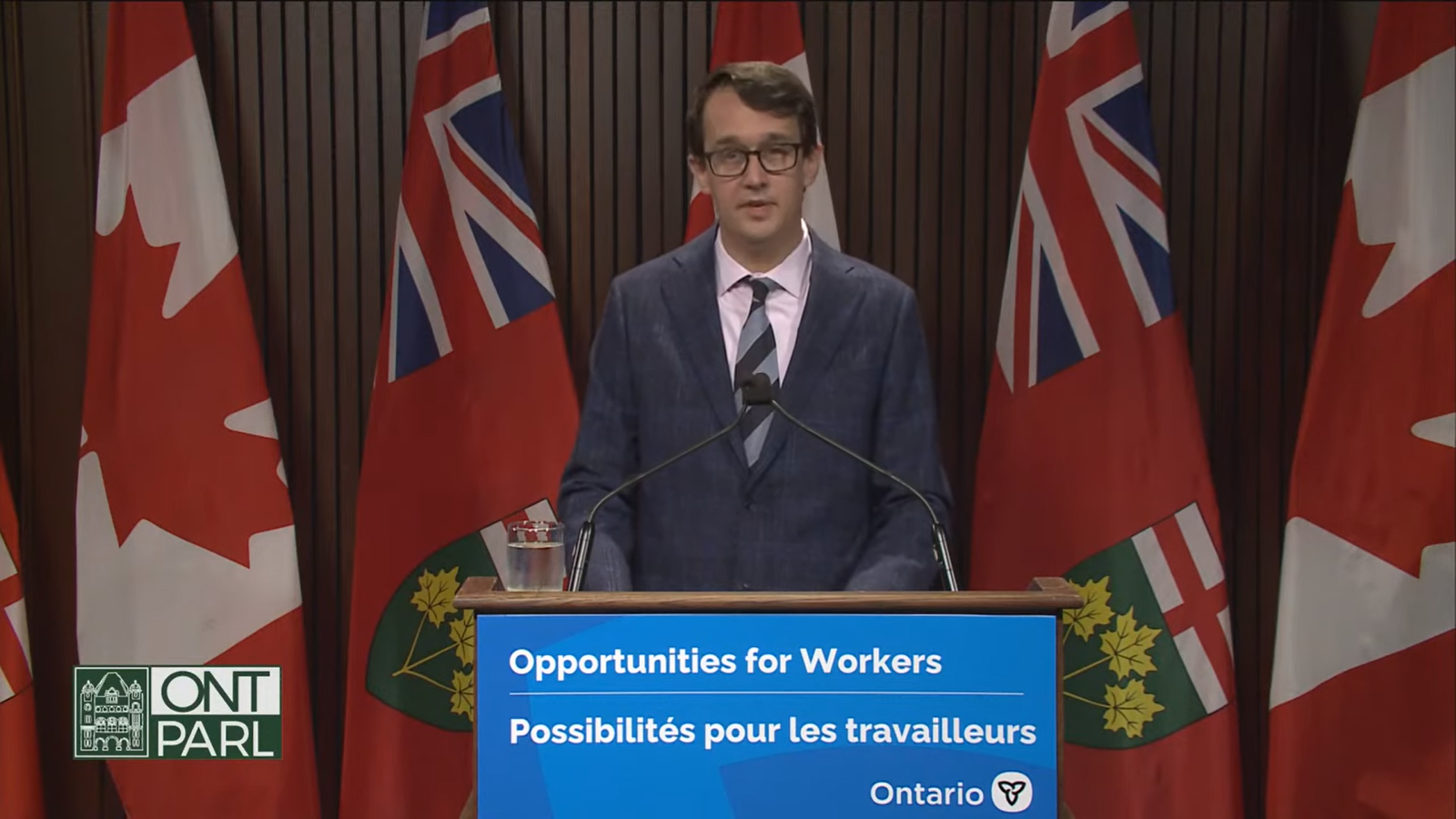Yesterday’s announcement by the Ontario government that barriers to foreign credential recognition would be removed was met with a healthy dose of skepticism from the journalists at the press conference and those who’ve been following this issue for decades.
Minister of Labour, Training and Skills Development Monte McNaughton announced that if their proposed legislation is approved, by fall, internationally-trained immigrants would be able to practice their profession or trade.
According to the Minister, the legislation would eliminate the “unfair” requirement to have Canadian experience in order to be licensed; it would eliminate duplicate language proficiency tests; and it would speed up the licence registration and assessment processes. It would be building on the Ontario Bridges Training Program, for which $67 million has been allocated over the next three years to fund 46 projects to help international educated professionals get licensed, McNaughton said.
“For newcomers, finding work is their top priority. They have the skills and motivation, but face multiple barriers to getting started…they often face endless government bureaucracy and red tape,” he said, flanked by Deepak Anand, parliamentary assistant, and Sheref Sabawy, MPP for Mississauga-Erin Mills.
“Helping these workers start careers in the industries that need them would be life-changing.”
However, critics argue Ontario’s labour shortage is more about providing living wages than about recognizing foreign credentials.
Long overdue
According to the government’s press release, the legislation will apply to “non-health regulated professions and compulsory trades including professional engineers, architects, plumbers, electricians, accountants, hairstylists, teachers and early childhood educators.” McNaughton said they are considering including health professions in the future.
However, journalists were quick to point out that the announcement comes not only after decades of successive Liberal and Conservative governments promising similar things to no avail, but also days after Premier Doug Ford suggested some immigrants come to Canada just to collect social assistance.
“I think many people will point out that the Premier is saying two things at the same time, and some immigrants have actually pointed that out to us,” said one journalist. “What concerns do you have about attracting skilled labour from skilled immigrants with those comments hanging out there?”
“What’s different about it this time?” asked another.
“Actions speak louder than words,” answered McNaughton, though he had previously admitted the move was “long overdue.”
“Our government is moving forward with an ambitious agenda.”
Unrelated, precarious jobs
Ontario is the province that welcomes most immigrants than any other. Yet, only 25 per cent of those immigrants get a job matching their skills, McNaughton said.
The main barrier has been the Canadian experience requirement, which is virtually impossible to get since people can’t get licensed in their field to get that experience in the first place. This is coupled with the fact that despite legislation in 2006, most licensing and regulatory bodies don’t recognize experience gained abroad.
This has forced many immigrants either to return to school to acquire Canadian qualifications, or to abandon their fields. Others take up unrelated, precarious minimum-wage jobs. They do what they can to “make ends meet,” as Riddhi Agarwal, a lawyer from India, said during the press conference as she shared her own struggle as a way to highlight the benefits of the proposed legislation.
Though she celebrated the government’s efforts, saying she felt “blessed” about the move – as law degrees are one of the professions covered by the legislation – she recognized the toll these barriers have taken on newcomers such as herself.
“It shouldn’t be this difficult,” said Agarwal, a barrister and solicitor who today runs her own legal firm, but only after many “sleepless nights and immense financial difficulty” after having to work as an Uber driver and at the LCBO while completing her equivalencies.
“Some have unfortunately given up on pursuing their professions entirely. It is mentally and emotionally stressful for newcomers,” she said.
‘We need more immigrants’
Removing the requirement and helping licensing bodies process applications faster will help many newcomers, though changes are not expected to take effect for at least two years, if the legislation passes.
When pressed about why this is happening now when it’s been clearly a barrier for so many for decades, the minister said they are deciding to go “against the grain” in order to help immigrants and their families “reach their full potential.”
He also mentioned how crucial this plan was to fill in the “shortage in the skilled trades.”
“We need 100,000 workers in Ontario in the trades over the next number of years. These are jobs that pay six figures with a defined pension and benefits,” he said.
“Again, this is about unlocking the full potential of immigrants and supporting them and their families with bigger paycheques and better working conditions, and it will go along way with dealing with the labour shortage.”
He also said he had been working closely with Immigration, Refugees and Citizenship Canada (IRCC) Minister Marco Mendicino to lobby for “greater allotment” of immigrants through the Ontario Immigrant Nominee Program.
“We want more autonomy over the immigration system,” he said. “We need more immigrants.”
Wage, not labour, shortfall
This skills mismatch has left nearly 300,000 jobs unfilled, McNaughton said. According to him, this represents a loss for the province of $20 billion a year for the next five years.
The new legislation would therefore be a “win-win-win,” according to MPP Sabawy, a first-generation immigrant who said he, too, experienced difficulty getting his credentials as an IT manager recognized when he first came to Canada 26 years ago.
According to him, it would help immigrants “jump-start” their careers and integrate while filling in the vacant positions for employers, all the while creating a “successful environment for new Canadians” to grow the economy.
But critics say that employers will continue to have vacant positions, particularly labour, until wages improve.
For instance, a report from the Canadian Centre for Policy Alternatives found that by February of this year, a quarter of a million workers in food and hospitality (hotels, etc.) had found jobs outside that sector, many of them switching to other roles including “professional services.”
Labour leaders are quick to point out that that means it’s not so much about a shortage of labour but less-than-livable wages.
“I think that that’s the same with some of the sectors that are having a hard time finding workers,” said Deena Ladd, executive director of the Workers Action Centre during an interview on the CBC’s Ontario Today.
Ladd was commenting on the federal government’s decision to stop wage and rent subsidies this Saturday as watered down emergency benefits replace them.
“If you (businesses) think that you can just provide minimum wage jobs with no benefits, with insecure hours, with basically schedules that change from day to day to day, and where now workers are having to put their health on the line – if you want workers to do those jobs, you’re going to have to increase the wages, and you’re going to have to make those jobs better quality jobs.”
This article was written as part of the ‘NCM – Village Media Advanced Training and Mentorship for Immigrant Journalists’ special project.
Fernando Arce is a Toronto-based independent journalist originally from Ecuador. He is a co-founder and editor of The Grind, a free local news and arts print publication, as well as an NCM-CAJ member and mentor. He writes in English and Spanish, and has reported from various locations across Canada, Ecuador and Venezuela. While his work in journalism is dedicated to democratizing information and making it accessible across the board, he spends most of his free time hiking with his three huskies: Aquiles, Picasso and Iris. He has a BA in Political Science from York University and an MA in Journalism from Western University.



This demonstrates that Ontario Human Rights Commissions law on Removing the “Canadian experience” barrier in 2013 was never taken seriously – 8 years later 75% of immigrants are still discriminated against the same amount as before. It also shows 2021 legislation will fail because Canada is a “common law” jurisdiction – law is derived from previous decisions not new statutes.
2013 legislation failed because of judicial decisions made in 1980, 1981, 1988, 1998, 2010, and 2012 determine if there was discrimination during hiring – see 2012 HRTO 1995 (CanLII) | Ellis v. SSAB Central Inc para 62. These set the precedent that the immigrant must prove they were qualified, not hired, and a Canadian not better than them was. The decision on who was better is with the employer so the immigrant will always lose a Human Rights complaint. The Tribunal always dismisses such complaints because the immigrant is guaranteed to lose with that criteria. Searching through previous decisions no immigrant has ever won at Human Rights Tribunal Ontario – despite 75% being recognized as victims. The laws are purposely out of reach of immigrants so employers can continue abusing them whilst Ontario falsely claims to be the most accommodating place on earth. It is a scam.
Notably Ontario always re-packages this new legislation each time there is a drop in the immigration number or there is a financial crisis.